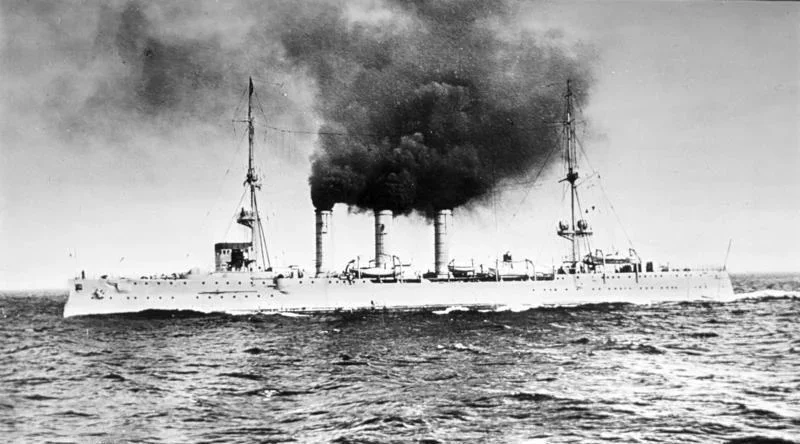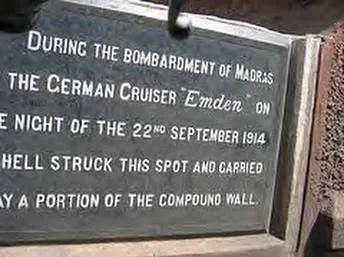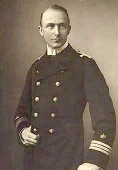Brahmanyan
Active member
 Visit of SMS Emden:
Visit of SMS Emden:It happened in Madras exactly ninety eight years ago to this date on September,22,1914. The city was bombed from sea by a German war ship named
SMS Emden.
SMS Emden (Seiner Majestät Schiff -His Majesty's Ship) was a most successful German commerce raider during World War I at sea. The ship was named after a small town in northern Germany on the banks of river Weser which flowed into the North Sea.The ship formed the part of German East Asia squadron based at the port of Tsingtao on the Kiachow bay located near the tip of China's Shantung peninsula. This 3500-ton fast,light cruiser Emden was commanded by "daring,skillful and chivalrous Captain Karl Friedrich Von Müller; forty-one- year old ,tall, blond Prussian" .
With the outbreak of World War I (1914-18) Emden sailed off from its parent squadron and steamed into Bay of Bengal, an area teemed with British shipping .For three months from August 14 to November 9, Emden ravaged allied shipping along the east coast of India and Indian Ocean, virtually paralysing British trade along the Bengal coast .This single ship forced Admiralty to retain ships at ports and made troop-carrying vessels sail in convoys protected by escorts. Within a span of four days in September 10-14, 1914, Muller sank 8 British steamers on the approaches to Calcutta. With determination British Admiralty in London pooled the resources of empire to form hunter-killer groups to comb ocean to hunt down Emden, their elusive foe.
Fame of Emden rests on its Captain's ability to evade Royal Navy for so long. The ship used to appear at unexpected places at will like that of a ghost ship.This was possible because its captain masked ship's movements by resorting to a simple trick, by installing a dummy funnel which gave it an appearance of 4-funnel British cruiser instead of 3-funnels it had.
SMS Emden searched the southeast waters off the coast of Burma, Capt. Müller found no prizes there, he changed course to the west. The captain had been planning a raid on some British shore installation, and now decided to put his plan into effect. He wrote in his log: "I intended going from the Rangoon estuary to Madras and, in the dark, shelling the oil-tank installations….I had this shelling in view simply as a demonstration to arouse interest among the Indian population, to disturb English commerce, [and] to diminish English prestige."
After coaling from Markomannia, Capt. Müller steamed his ship Emden southwest, towards Madras, all the while listening to radio traffic between British warships searching for their elusive enemy. By the evening of September 22, 1914, the German cruiser was off Madras, with the city's lights in view to the west.Then came the command "Searchlights." and. these in a few seconds found their target, which happened to be the law court Buildings of Madras, with Light-house beacon mounted on the roof. But the bomb fell on the wall of the Chennai High Court and its fragments are in the collection of the Government Museum, Chennai and of the Fort Museum. You can find a stone plaque describing the incident at the place where the bomb fell in the High Court Buildings. Another, fell opposite to the Fort St. George in the sand and it did not explode. The ship's search light fell on the huge petroleum tanks of the British owned Burmah Oil Company by the northern side of the port. The engines were stopped and the first shots fired out of five guns. Another broadside was fired. but fell short of the target: a second shot hit one of the petroleum tanks, causing it to burst into flames and explode. For ten minutes Emden steamed parallel to the coast, unleashing some 130 shells at the white-painted oil tanks. One of the six tanks exploded in a ball of flame; four others were pierced and damaged but did not catch fire. As a result of the raid, more than three hundred fifty thousand gallons of fuel (Kerosine) were destroyed, four people were killed, and "British prestige was dealt a considerable blow." It took one and half days to put off the fire.The bombardment lasted from 9.03 to 9.45 PM. During this time the British shore batteries fired only three shots, which went right over Emden. After the third shot nothing was heard from the port. During the bombardment a bomb accidentally hit a merchant steamer, which caught fire, killing one of the crew. It was 9.47 when Emden left Madras, on preset course set with all lights out and travelled on its way to the French town of Pondicherry.

Mean while in Madras, Lord Pentland, then governor of Madras, was camping in Ooty. He came down from the hills on Sept.25 three days after the bombing. He met officials at Central station at 7.10 a.m., proceeded to the harbour to inspect the damages, visited General Hospital to meet the wounded, and by 10.15 a.m., was in the government house and proceeded to Ooty to continue his stay there.The citizens of Madras responded to the event in the expected way by spreading roumers and panic. Which in turn instigated people to vacate the city. Almost 20,000 people left the city in panic.
Emden undoubtedly was the most successful German commerce raider during Great War at sea.She captured 24 steam ships during her short career September-November 1914 which includes sixteen British ships, which were sunk, at an estimated loss of £2,200,000. She also played havoc on the British trade of the Bay of Bengal, closing Colombo, Calcutta, Madras and Rangoon at various times. Her war time cruise was followed with great interest in Britain and Germany. And Captain Von Müller’s conduct of the raid was greatly admired.[SIZE=-1][SIZE=+1][SIZE=-1][SIZE=+1][SIZE=-1][SIZE=+1][SIZE=-1][SIZE=+1][SIZE=-1] He was awarded the Pour le Mérite (or Blue Max) and finally promoted to Kapitän zur See.[/SIZE][/SIZE][/SIZE][/SIZE][/SIZE][/SIZE][/SIZE][/SIZE][/SIZE]
 I would like to end this post with a few words about the Ship's commander Capt.Von Müller Capt.Karl Friedrich Max von Müller, captain of the SMS Emden born in 1873 was the son of a Colonel in the Prussian Army. He was a professional soldier who had attended military academy in Schleswig-Holstein. Though entered the army first he was transferred to the Imperial Navy later, where he made his mark as a great Captain in World war I. Captain Müller was always gentlemanly to the captains and passengers of the ships he captured, and he made certain that every captured British sailor was treated well and kept safe.Most of Emden's survivors spent the remainder of the war as prisoners on Malta.After his capture Von Müller was imprisoned in Malta and England, where he attempted an escape but was recaptured. While his executive officer, wrote his experiences on Emden and prospered after the war as an author and lecturer, Capt. Von Müller, in contrast, declined to speak on his experiences and lived quietly at his home in Blankenburg until his death in 1923. Asked once why he did not write a memoir, Capt. Von Müller replied, "I should not be able to escape the feeling that I was coining money from the blood of my comrades."
I would like to end this post with a few words about the Ship's commander Capt.Von Müller Capt.Karl Friedrich Max von Müller, captain of the SMS Emden born in 1873 was the son of a Colonel in the Prussian Army. He was a professional soldier who had attended military academy in Schleswig-Holstein. Though entered the army first he was transferred to the Imperial Navy later, where he made his mark as a great Captain in World war I. Captain Müller was always gentlemanly to the captains and passengers of the ships he captured, and he made certain that every captured British sailor was treated well and kept safe.Most of Emden's survivors spent the remainder of the war as prisoners on Malta.After his capture Von Müller was imprisoned in Malta and England, where he attempted an escape but was recaptured. While his executive officer, wrote his experiences on Emden and prospered after the war as an author and lecturer, Capt. Von Müller, in contrast, declined to speak on his experiences and lived quietly at his home in Blankenburg until his death in 1923. Asked once why he did not write a memoir, Capt. Von Müller replied, "I should not be able to escape the feeling that I was coining money from the blood of my comrades."I am not sure whether the present generation will understand or appreciate the historical importance of this post. But I am sure this post will evoke older generation to reminisce those glorious days when chivalry had different meaning . Finally by its exploits Emden became a household word in Tamil and Malayalam usage meaning "Shrewd, Evasive or Street-smart".
Regards,
Brahmanyan,
Bangalore.
Last edited:
